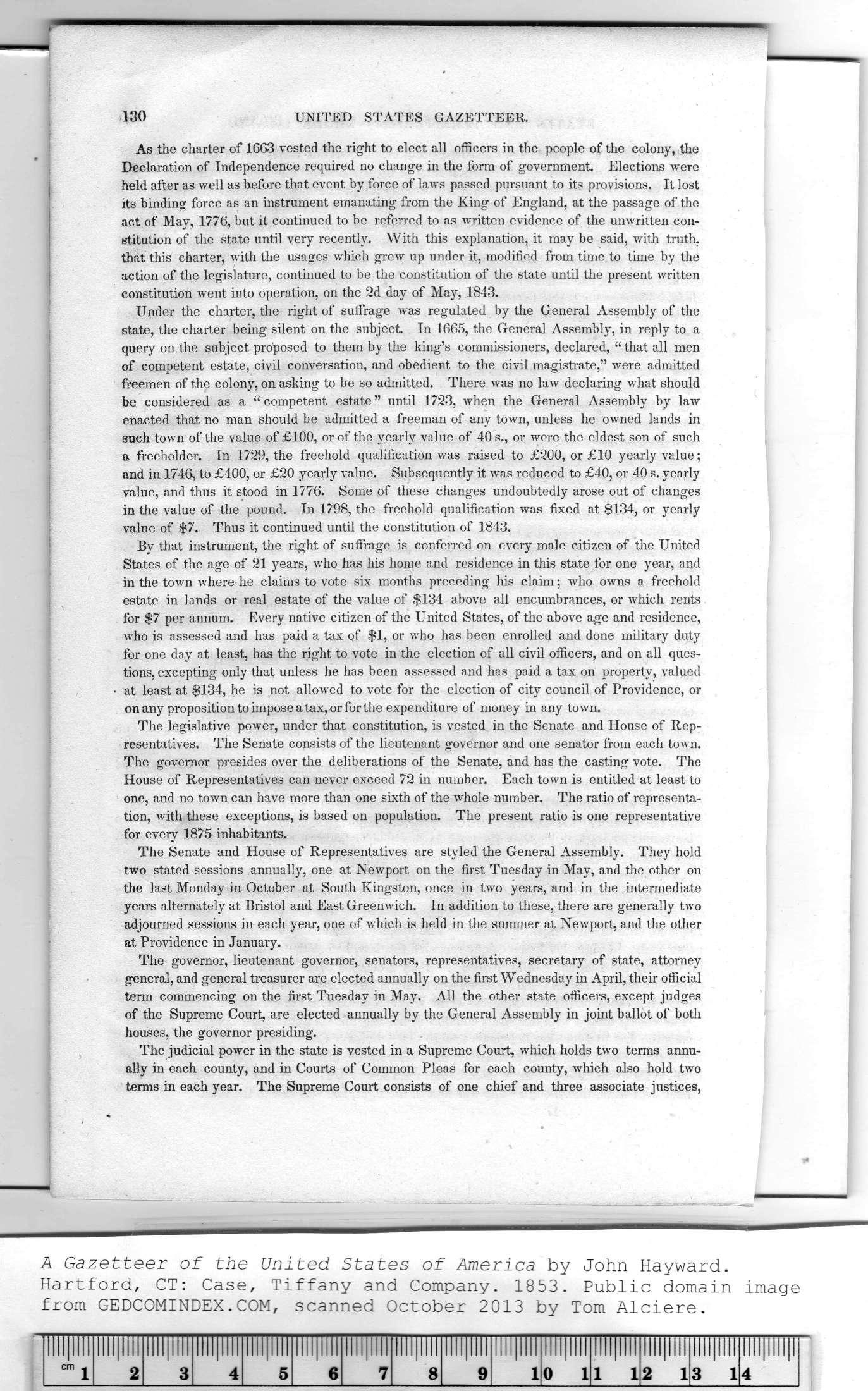|
|
Note: Ctrl and + increases the font size of the text below, Ctrl and - decreases it, and Ctrl and 0 resets it to default size.
130 UNITED STATES GAZETTEER.
As the charter of 1663 vested the right to elect all officers in the people of the colony, the
Declaration of Independence required no change in the form of government. Elections were
held after as well as before that event by force of laws passed pursuant to its provisions. It lost
its binding force as an instrument emanating from the King of England, at the passage of the
act of May, 1776, but it continued to be referred to as written evidence of the unwritten con-
stitution of the state until very recently. With this explanation, it may be said, with truth,
that this charter, with the usages which grew up under it, modified from time to time by the
action of the legislature, continued to be the constitution of the state until the present written
constitution went into operation, on the 2d day of May, 1843.
Under the charter, the right of suffrage was regulated by the General Assembly of the
state, the charter being silent on the subject. In 1665, the General Assembly, in reply to a
query on the subject proposed to them by the king's commissioners, declared, “ that all men
of competent estate, civil conversation, and obedient to the civil magistrate," were admitted
freemen of the colony, on asking to be so admitted. There was no law declaring what should
be considered as a “ competent estate " until 1723, when the General Assembly by law
enacted that no man should be admitted a freeman of any town, unless he owned lands in
such town of the value of £100, or of the yearly value of 40 s., or were the eldest son of such
a freeholder. In 1729, the freehold qualification was raised to £200, or £10 yearly value;
and in 1746, to £400, or £20 yearly value. Subsequently it was reduced to £40, or 40 s. yearly
value, and thus it stood in 1776. Some of these changes undoubtedly arose out of changes
in the value of the pound. In 1798, the freehold qualification was fixed at $134, or yearly
value of $7. Thus it continued until the constitution of 1843.
By that instrument, the right of suffrage is conferred on every male citizen of the United
States of the age of 21 years, who has his home and residence in this state for one year, and
in the town where he claims to vote six months preceding his claim; who owns a freehold
estate in lands or real estate of the value of $134 above all encumbrances, or which rents
for $7 per annum. Every native citizen of the United States, of the above age and residence,
•who is assessed and has paid a tax of $1, or who has been enrolled and done military duty
for one day at least, has the right to vote in the election of all civil officers, and on all ques-
tions, excepting only that unless he has been assessed and has paid a tax on property, valued
at least at $134, he is not allowed to vote for the election of city council of Providence, or
on any proposition to impose a tax, or for the expenditure of money in any town.
The legislative power, under that constitution, is vested in the Senate and House of Rep-
resentatives. The Senate consists of the lieutenant governor and one senator from each town.
The governor presides over the deliberations of the Senate, and has the casting vote. The
House of Representatives can never exceed 72 in number. Each town is entitled at least to
one, and no town can have more than one sixth of the whole number. The ratio of representa-
tion, with these exceptions, is based on population. The present ratio is one representative
for every 1875 inhabitants.
The Senate and House of Representatives are styled the General Assembly. They hold
two stated sessions annually, one at Newport on the first Tuesday in May, and the other on
the last Monday in October at South Kingston, once in two years, and in the intermediate
years alternately at Bristol and East Greenwich. In addition to these, there are generally two
adjourned sessions in each year, one of which is held in the summer at Newport, and the other
at Providence in January.
The governor, lieutenant governor, senators, representatives, secretary of state, attorney
general, and general treasurer are elected annually on the first Wednesday in April, their official
term commencing on the first Tuesday in May. All the other state officers, except judges
of the Supreme Court, are elected annually by the General Assembly in joint ballot of both
houses, the governor presiding.
The judicial power in the state is vested in a Supreme Court, which holds two terms annu-
ally in each county, and in Courts of Common Pleas for each county, which also hold two
terms in each year. The Supreme Court consists of one chief and three associate justices,
|
lllllllll |
lllllllll |
llll llll |
lllllllll |
llll llll |
|
lllllllll |
llll llll |
lllllllll |
llll llll |
lllllllll |
lllllllll |
lllllllll |
lllllllll |
llll|!!ll|l |
|
cm j |
2 |
3 |
4 |
5 |
6 |
7 |
8 |
9 |
1 |
0 1 |
1 1 |
2 1 |
3 1 |
4 |
|
